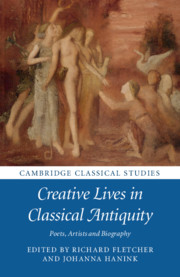Book contents
- Frontmatter
- Contents
- List of contributors
- List of illustrations
- Part I Opening remarks
- Part II Reviving dead poets
- Part III Lives in unexpected places
- Part IV Laughing matters and Lives of the mind
- 8 On bees, poets and Plato: ancient biographers' representations of the creative process
- 9 The life of Aristippus in the Socratic epistles: three interpretations
- 10 Imagination dead imagine: Diogenes Laertius' work of mourning
- Part V Portraits of the artist
- Works cited
- Index
9 - The life of Aristippus in the Socratic epistles: three interpretations
from Part IV - Laughing matters and Lives of the mind
Published online by Cambridge University Press: 01 December 2016
- Frontmatter
- Contents
- List of contributors
- List of illustrations
- Part I Opening remarks
- Part II Reviving dead poets
- Part III Lives in unexpected places
- Part IV Laughing matters and Lives of the mind
- 8 On bees, poets and Plato: ancient biographers' representations of the creative process
- 9 The life of Aristippus in the Socratic epistles: three interpretations
- 10 Imagination dead imagine: Diogenes Laertius' work of mourning
- Part V Portraits of the artist
- Works cited
- Index
Summary
Sometime in the second or third century AD an anonymous epistolographer authored a series of letters purporting to pass between Socrates’ followers after his death. The most interesting of these are ascribed to Aristippus, who was the notional founder of the sceptical and hedonistic Cyrenaic school of philosophy. Among the key sources for these letters were the collections of anecdotes and sayings that Momigliano has called the ‘truest antecedents of biography and autobiography’, which continued to make up the bulk of many works actually entitled ‘lives of the philosophers’ in this period. It is this biographical aspect of pseudepistolography which merits a discussion of these letters in the present volume. Aristippus does not discuss philosophical theories, but rather his own lifestyle and that of his addressees. This distinction between lifestyle and theory turns out to occupy a prominent place in the scholarship on the historical Aristippus, where it is also presented through the dichotomy between ‘performance’ or ‘art’ and ‘science’. The Socratic epistles afford us an opportunity to re-examine these dichotomies. The goal of this chapter is therefore to explore several ways in which, while imagining Aristippus’ discussion of his ‘artful’ lifestyle, the epistolographer permits us to reconstruct and evaluate an Aristippean philosophy.
The epistles and existing scholarship on Aristippean ethics
I will begin by offering a provisional reading of ethics in the epistles. There are two guiding questions for this section. First, how can these letters contribute to existing scholarship on Aristippean philosophy? Second, what sort of ethics does Aristippus defend and display in these letters? In order to motivate these questions, it is first necessary to offer an overview of the relevant passages.
Though Aristippus is the author, recipient, or subject of eleven of the thirty-five epistles, I will be focusing on epistles 8 through 13, which provide the most detailed and coherent portrait. In letter 8 Antisthenes, who was famed in antiquity for his austerity, writes from Athens to Aristippus, who is living it up in the court of Dionysius II of Syracuse. Antisthenes writes, ‘The philosopher isn't someone who stays with tyrants and devotes himself to Sicilian tables, but rather someone who lives in his own country and desires only what's sufficient’ (p. 244.1–3 Malherbe).
- Type
- Chapter
- Information
- Creative Lives in Classical AntiquityPoets, Artists and Biography, pp. 198 - 218Publisher: Cambridge University PressPrint publication year: 2016



